DIVINE PROVIDENCE TRAINING CENTER – A UNIQUE SCHOOL FOR PASTORS
A DPTC graduate recently described the majority of Kenyan pastors, their call to ministry, their needs and their hopes. He also summed up how Divine Providence Training Center has been an answer to their prayers in equipping them for ministry, fulfilling their needs and energizing their hopes. This graduate is Steve Mutura, class of 2010, who was able to continue with his studies at a Bible college in Uganda from which he recently graduated with honors. DPTC is delighted to have Steve join the DPTC staff as the School Director’s Administrative Assistant. Here are Steve’s answers to the most common questions regarding training pastors in Kenya and about DPTC in general.
Aren’t pastors in Kenya already trained?
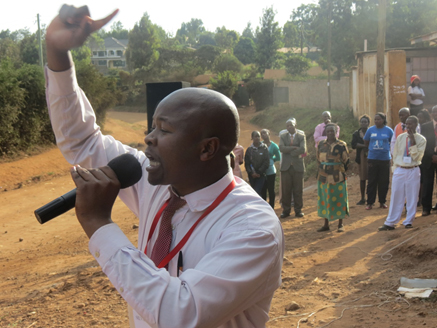
Probably when you hear of training pastors you say, “How on earth did they become pastors in the first place without training? Who employed them without training?” Here is the answer. Our call is unique. Pastors in Africa, the majority of them, are not employed. They heard God’s call to ministry and followed, starting churches that are, most of the time, not able to support them. Consequently, they have no salary even though they often are expected to feed the very people they pastor.
“Then they should raise money and go to school,” you may be thinking. These pastors also are too poor to be able to raise the money needed to attend a college. Some of them do not even dream of attending one simply because that money is too much for them. Some of them cannot even afford two copies of the Bible.
Furthermore, these pastors cannot be accepted into college because they do not have the necessary papers (degrees or diplomas). Or, they have lower grades than would be accepted by a college, so their chances of ever getting into a Bible training school are completely minimized.
The situation is not hopeless for them though. That is why DPTC is here. It aims to give these pastors the training they need so they can serve better and transform the communities to which they have been called.
These pastors are the agents that can transform their communities better than anyone in that society. This pastor, even without training, is a very central point in the life of a community in the Kenyan society. They lead prayers at the chiefs’ meetings, the district officers’ meetings and even the president’s meeting commences only after prayers have been led by religious leaders. If there is a communication to be made to the community, the pastor does that best. When the community suffers loss or misfortune, the pastor is expected to bring hope in that situation. I hope you are not still asking why we need to train that pastor.
But far above serving the community, the great commission can only be realized within the church context. It is the pastor who trains a convert to be a disciple. It is the pastor that administers church discipline. It is the pastor that feeds the flock. HE IS INDEED BETTER POSITIONED TO MEET THE COMMUNITY’S NEEDS, BOTH PHYSICAL AND SPIRITUAL, THAN ANYONE ELSE. YOU CAN HELP THE PASTOR DO THIS!!! THIS IS WHY DPTC IS HERE!!
If the pastors cannot afford school tuition, how is DPTC supported?
Initially the school is being supported by the donations of people who love the school and feel led to help support it. However, DPTC’s vision is for the school is eventually to be self-sustaining. It is well understood that the school cannot always depend on donations to run and continue to grow the school. In view of that, the school premises are now open to the public for hire in order to generate funds to sustain the school as the campus doubles as a conference/events center, helping us fight total dependency. This will be a long slow process, but it is now well underway.
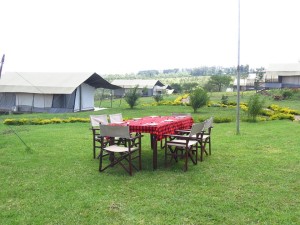
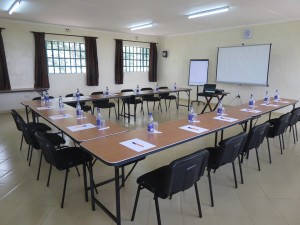
School Facility Generates Income through meals, special events, retreats and conferences
What is taught at DPTC?
To help us meet the needs of Kenyan pastors, we have developed a curriculum custom designed for our students by DPTC’s seminary-degreed teachers. The curriculum manifests itself in four categories:
- Bible courses like the books of Acts and Romans and others
- Theology courses like survey of Bible doctrines and the theology of worship
- Ministry course like the role of a pastor
- General courses like conflict management and resolution and counseling
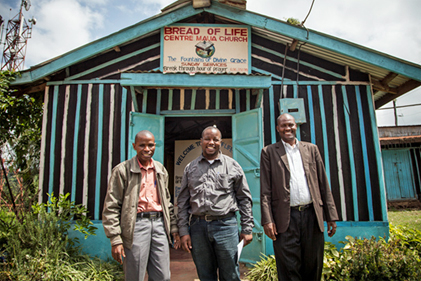
We have confidence that our training does not only inform the mind, but also trains the hands, enabling the pastor to deal with the challenges of day-to-day living.
In addition to on-site training, between school sessions, the students are responsible for completing take-home assignments due on the reporting day of the next session. These take-home assignments are designed to extend the students’ reading and to follow-up on the classes taught.
To know how the students are doing, we have visits by the school staff between the sessions as is possible. This allows our school staff to monitor, evaluate and be able to offer help to particular students as their needs dictate.
If the students are full-time pastors, how can they come to school and still maintain their churches and ministries?
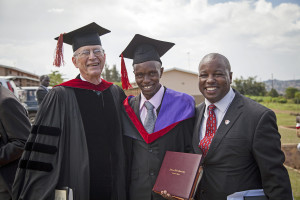
“Who looks after their families and churches when they are away?” you maybe asking yourself. So that we don’t take the pastors away from their families and congregations for long, the two years of study at DPTC has been divided into eight sessions. Each on-site session takes two weeks and is held once a quarter. Therefore the pastors will come to school for two weeks, four times a year giving them ample time to give to their ministries. They also will have occasional two-four day retreats for supplementary training carefully measured throughout the two years.
